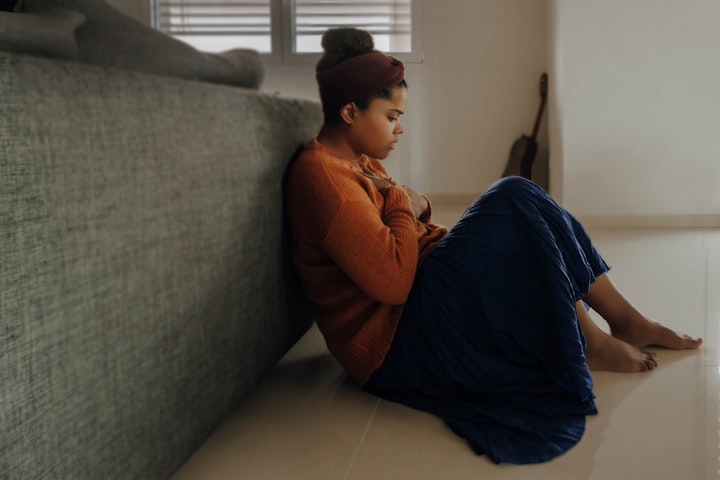How to Really Manage Anxiety
5 Real Ways to Manage

If you’re reading this, you probably have anxiety, panic disorder, or something along those lines. You’ve probably also read a million articles, blog posts, and every Google result you could find on ways to manage it.
I know this because I've done this. Because I do this. A lot of times, anxiety advice is coming from doctors or people who don't have anxiety (whether they struggled with nervousness is a different conversation).
Realistically, these are bad people to get advice from because they don't know how your brain works on anxiety. Yes, doctors can study it, but they don't live with it.
They don't understand how rationality flies out the window. How it can be impossible to move, much less do anything beneficial to manage it.
If you're like me, you've been given the look of disbelief (and/or pity) trying to explain how crippling this is. If so, you're in the right place.
Long story short, I've dealt with anxiety nearly my whole life. I grew up in an abusive home, contracted chronic illness, and was still expected to "be normal" despite these difficulties. So, when I say I understand, I understand.
Now that my credentials have been established, let's jump into some ways that might be actually helpful (and realistic) to manage your anxiety.
Talk to a Psychiatrist

I know, I just badmouthed doctors above, but this is really important. Psychiatrists are specifically trained to work with these kinds of issues.
If your anxiety is getting out of control, it's better to see someone now than to wait until you can't bear it (plus the typical waiting period for scheduling).
To add, you might not actually be experiencing anxiety. It could be generalized anxiety disorder (GAD), a panic disorder, ADHD, etc.
There's a lot of things that cause anxious symptoms. But if you don't find the root of your issue, you won't find the solution.
Personally, I was diagnosed with a panic disorder. This gave me better understanding of my triggers, what was actually happening, and how to specifically manage it.
To add, psychiatrists are typically licensed to give medication. This can be (and is) a game changer when it comes to mental health. There's no shame in it.
“Declutter to Mind“ Meditation

Listen, I know. Everyone has told you to try meditation. It doesn't work. You can't sit still that long. Whatever your reasons for not liking it, I've been there. But this app is different.
On DtM, you can choose guided meditations based on what you're struggling with. For instance, some options include:
- "Mindfulness for Difficult Emotions"
- "Stop a Panic Attack"
- "Mindfulness for Morning Anxiety"
- "Breathe to Release Immediate Stress"
- "Feeling Miserable"
There's also specific problem areas like "Trauma, "OCD,” and "Deep Sleep."
It also offers different length meditations in 5 minute increments, so there's no pressure to sit there 30-60 minutes if you can't.
Literally, during the first TWO times I used the app, I actually fell asleep. That's how calm and relaxed I was.
Since then, when my brain is feeling jittery, overwhelmed, too busy, or loud, I try to do one of these. It doesn't work every time, but it has worked a lot-and it's changed my life. Now, a lot of times my anxiety gets cut off before it can build beyond control.
Minimize your Senses

We are constantly taking in so much information at any given point. Our vision, our sense of smell, our hearing, etc.
Sometimes, especially when we're feeling panicky, that can lead to too much information.
All at once your brain does a hard reboot, you're overwhelmed, and boom: anxiety.
So, sometimes shutting out one or two can help slow down how much information you're taking in and help you feel less overwhelmed.
Examples: lie down in a dark room (you can either lie there in quiet or give yourself something to focus on), put in headphones and close your eyes, put on/take off socks & pull up/let down your hair.
Sometimes, it's the little things that have sent us over the edge.
Focus on One Thing

This is one of the best tricks for panic attacks. As I said above, too much information can be overwhelming. And in today's society, we're almost always multi-tasking.
Even while relaxing, we're often doing more than one thing. We're watching TV, but also on our phones. This sort of cancels out the relaxation of either activity.
It can be very calming to set your phone down (even if you have to put it out of reach) and focus on one thing.
It's all about being present in the moment.
You will find your anxiety decreasing when you give yourself just one thing to focus on. It helps take your thoughts away from your anxiety/panic.
So whether it’s your breathing, an object, or even just the TV, focusing on one thing can help give your brain something to do besides panic.
Set Rules for Yourself - Then Follow Them

Anxiety often comes from us being pushed beyond our limits. Sometimes we can't control that, but other times we can. This is why it's important to set self-care rules for yourself and then follow them.
Whether it's a cutoff time for work/ studying, sticking to a relaxation routine, or learning how to say "no" to things, knowing your boundaries can help limit your anxiety.
Once we learn how to take care of ourselves-and by that I mean love ourselves-then we can turn away from things that cause us to get stressed, anxious, overwhelmed, and panic.
This isn't an easy habit to build, but it's a lasting one. Learning your boundaries and sticking to them can be life-changing.
——
One of the hard truths about anxiety is that are no "cures" to make it go away. It's a constant-and sometimes crippling-battle. It's very difficult to live with.
It goes way beyond nervousness-it can be debilitating.
It can be even harder to deal with when you're surrounded by people who don't understand/can't help you and you don't know how to help yourself.
I hope that at least one, if not all, of these tips help you manage your anxiety.
Though you might not be able to rid yourself entirely of it, I hope you are able to learn some coping mechanisms and habits that decrease its impact on your everyday life.
About the Creator
Ashley Tripp
I’m a freelance writer & artist. I create pieces about the things that move me with the hopes that they move my readers too. My work has been featured in multiple publications. Check out my website for more at https://msha.ke/ashleytripp
Enjoyed the story? Support the Creator.
Subscribe for free to receive all their stories in your feed. You could also pledge your support or give them a one-off tip, letting them know you appreciate their work.






Comments
There are no comments for this story
Be the first to respond and start the conversation.